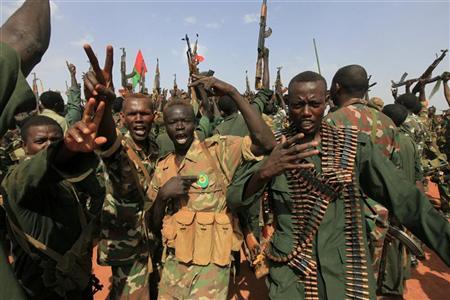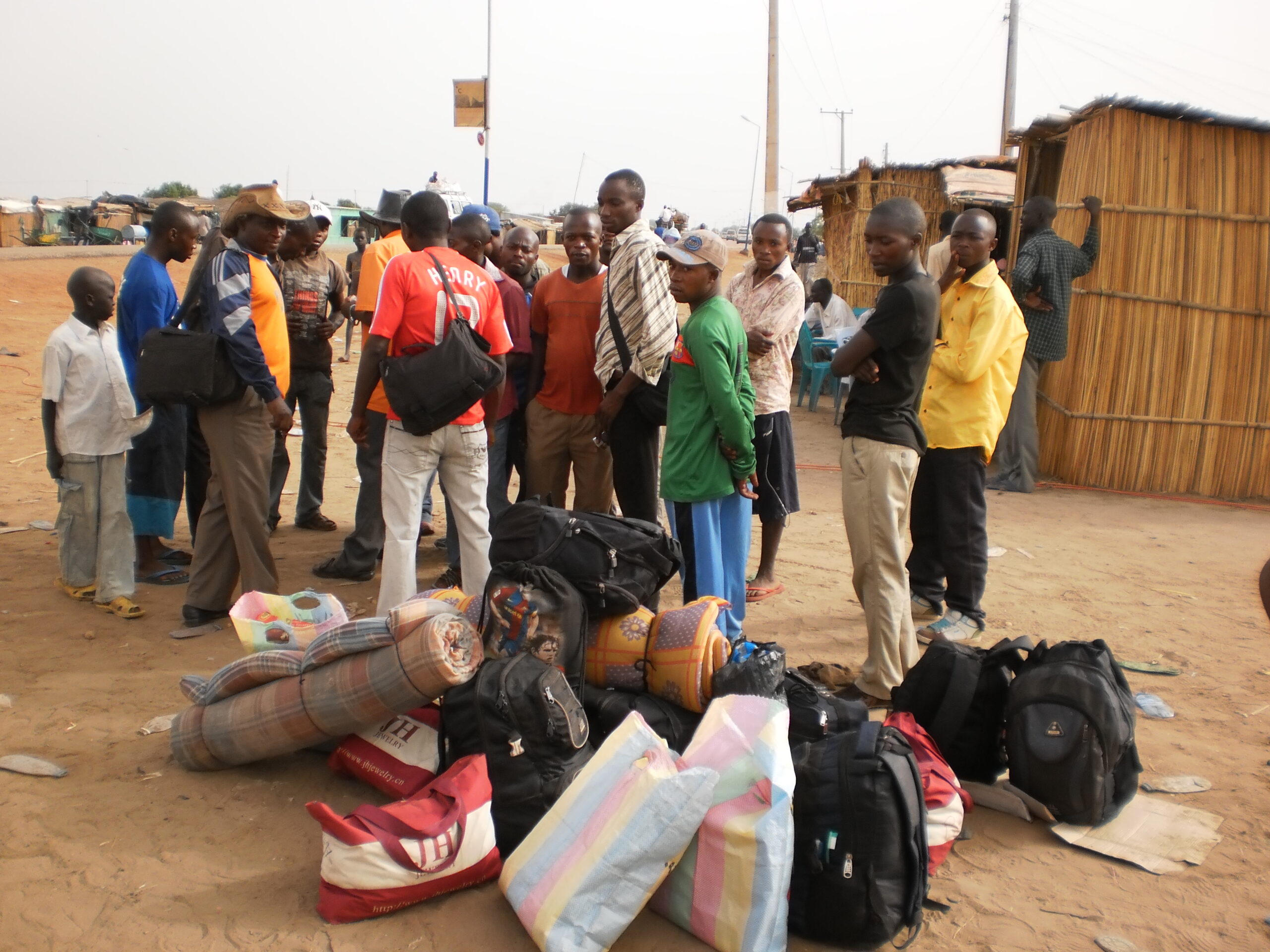Sudan keeps bombing South, SPLA fears attack on Bentiu
April 24, 2012 (LONDON) – Sudan resumed its bombing of South Sudan’s Unity State on Tuesday, the military claimed, a day after two people were killed when bombs landed near the state’s capital Bentiu.

In statements indicative of the current tensions and military build up on either side of the border, a South Sudanese intelligence officer has expressed fears that the Sudanese army may try and attack Bentiu.
Bentiu, where some of the bombs landed on Monday, lies at least 60 kilometres (40 kilometres) from the border with North Sudan.
During his current visit to China – a large investor in the oil industries of both nations – South Sudanese president Salva Kiir said that the latest fighting amounted to a declaration of a war by the Sudanese government.
Fears are growing that the two sides could return to a full-scale international conflict over their disputed oil-rich border that was not demarcated before South Sudan seceded last year.
South Sudan’s army (SPLA) spokesperson, Philip Aguer, told Reuters that Sudanese Antonov aircraft had dropped bombs 40 km (25 miles) inside his country in the areas of Teschween, Panakuach and Roliaq on Tuesday.
Unity State’s governor, Taban Deng Gai, said that some of the bombs had landed on Lalop market and Panakuach. Monday’s bombs also hit a market at Rubkotna leading to southern claims that Sudan’s air force was deliberately targeting civilians.
Despite being condemned for the bombing by the United Nations Mission in South Sudan and the UN Secretary General Ban Ki-Moon, Khartoum continues to deny responsibility for any air attacks over South Sudan. A UN report covering April 13-19 said that “clashes and/or bombardments were reported in all five border states between South Sudan and Sudan, as hostilities continued between the two countries”.
Sudan Tribune‘s reporter in Bentui witnessed three MiG 29 fighter jets attacking the area on Monday. International journalists from the BBC, Reuters, AFP and others have all witnessed planes dropping bombs on Unity State since Monday.
SPLA soldiers have tried to fire back at the planes but without an air force South Sudan is at a severe military disadvantage. South Sudan appears to have suffered a large military defeat in Heglig – a disputed oil-producing area – over the weekend with an AFP reporter there saying the number of SPLA soldiers lying dead on the ground was “uncountable”.
With the war rhetoric – especially on the side of Khartoum – and propaganda machines in full swing it is hard to know which figures given by the two sides, if any, are true.
“The numbers of killed from SPLM are 1,200,” AFP reported Sudan’s military commander in Heglig, Kamal Marouf, as saying. Juba has denied it lost any soldiers during its retreat from Heglig and maintains the withdrawal was voluntary in order to comply with international demands.
Sudan has not given a figure for how many SAF troops died in the retake of Heglig, which the SPLA managed to hold for 10 days. During the SPLA’s occupation of Heglig the military said that it had lost 19 soldiers but had killed 240 Sudanese troops.
However, there are indications from SPLA soldiers that the figures of deaths from their ranks may be higher than top officials are willing to admit. On Tuesday the BBC’s correspondent in Bentui said that one soldier had remarked to him that: “A lot of people are dying”. And during the SPLA occupation of Heglig from April 10-20 an SPLA soldier told AFP in Bentiu that it was impossible to bury the dead or bring them back as: “There are so many bodies at the front line, so many dead”.
South Sudan’s ruling SPLM has expressed frustration that after it complied with demands to move out of Heglig, the international community has not taken more action against Khartoum’s subsequent attacks.
“We were asked to withdraw from Heglig: we did. They have been asked to stop the aerial bombardment and incursions into South Sudan: they have not done so,” Unity State governor Taban Deng told AFP. The governor said that wounded soldiers and farmers had been taken to to Bentiu hospital.
Despite the border being quiet “with the exception of aerial bombardment”, according to Deng, South Sudan says it fears SAF is planning to push deep in Unity State and try and take control of Bentiu town.
South Sudan’s deputy director of military intelligence, Mac Paul, said his sources indicated that “the Sudanese army is mobilising for a push on Bentiu”. The claim could not be confirmed.
Rebel group the South Sudan Liberation Army (SSLA), which Juba describes as Khartoum-backed mercenaries, threatened to attack Bentiu earlier this week. South Sudan claims that the SSLA acted with SAF in cross-border raids over the weekend.
Khartoum denies working with or supporting rebellions in South Sudan.
On Monday the SSLA claimed that they captured Lalop garrison in Unity State from the army on Sunday and that their forces would march on Bentiu and “liberate” the area within days. This is not the first time the SSLA have made such claims and previously no such assault on Bentiu has materialised.
A recent report from the Small Arms Survey found evidence that both Juba and Khartoum were backing rebellions in other’s territory.
Khartoum accuses Juba of aiding anti-government rebellions in Darfur, South Kordofan and Blue Nile where there have been reports of increased insecurity as the border conflict intensified over the last few weeks.
Both sides are reported to be amassing troops and artillery near the border and have launched mobilisation campaigns to recruit young men into the army and paramilitaries.
In Heglig AFP reporters witnessed crates of military materiel and pickup trucks ‘crammed with ammunition, rifles, shovels, and mounted rocket propelled grenade launchers’ belonging to the Popular Defence Forces (PDF) Khartoum’s main paramilitary group.
BENTIU BUSINESSMEN FLEE BORDER CLASHES
The bombings, military build up and increasing tensions have triggered an exodus of foreign businessmen and investors from Unity State. On Tuesday more than 20 foreign traders from neighbouring Kenya, Uganda, Ethiopia and Congo-Kinshasa boarded buses heading southwards away from the border to the country’s capital Juba, Sudan Tribune‘s reporter in the area said.

Many East African’s have migrated to South Sudan since the 2005 peace deal which ended the previous north-south civil war, with more arriving after independence in July last year looking for work or to sell imported goods.
On Tuesday 13 traders from Democratic Republic of Congo left Bentiu town citing the recent bombings as their reason. Unity State officials say that two people died and six were wounded in the Monday bombings.
Wazekwa Balopoi, a Congolese national, told Sudan Tribune that he had been working in Bentiu selling clothes and necklaces but, fearing that the Sudan Armed Forces were attacking civilians, he has bought a bus ticket out of town.
Another foreign trader Peninah Akello, a Kenyan national, said she will take the risk to stay in Unity State despite the continued bombardment.
“One can decide to go or one can decide to stay, I might be terrified but I still have the feeling to stay behind”, she said, hoping that the conflict would end in due course.
South Sudan’s government says it is willing to return to peace negotiations but Sudan’s president Omer Hassan Bashir made it clear, while visiting Heglig on Monday, that he ruled out peace with South Sudan government, while the SPLM were still in power. Last week he described South Sudan’s leaders as “insects” that must be crushed and taught a lesson.
(ST)

